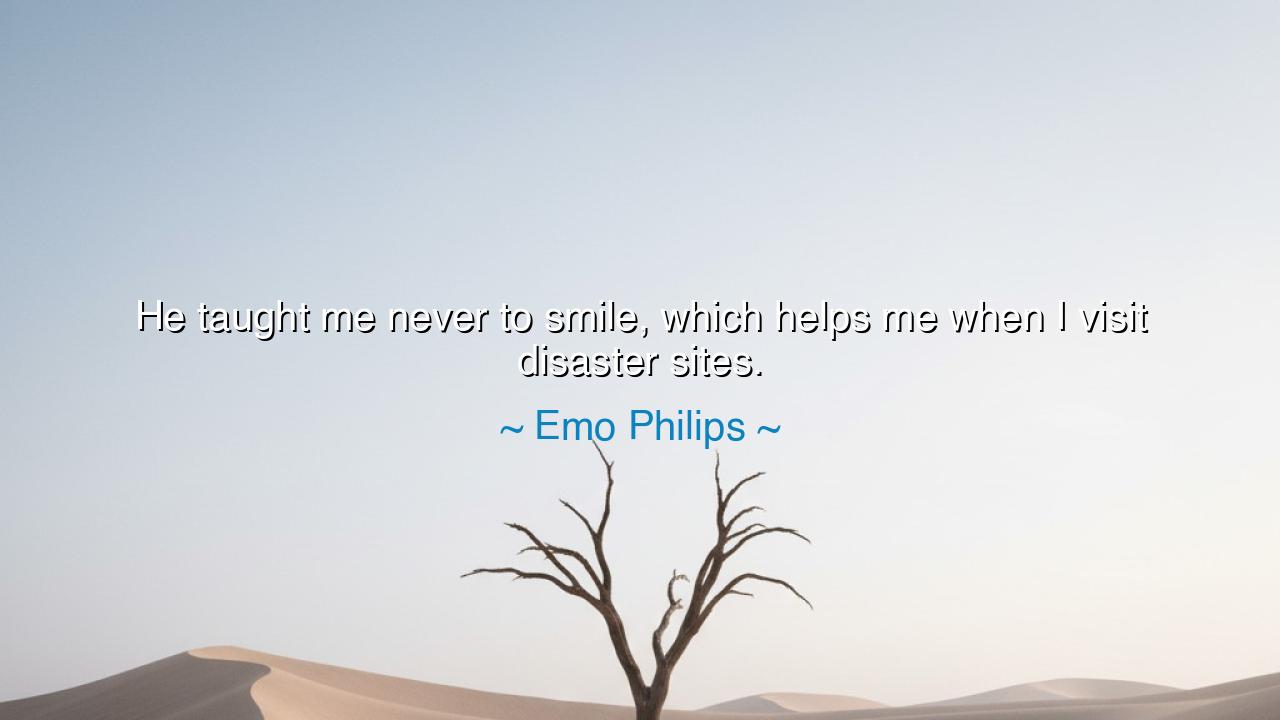
He taught me never to smile, which helps me when I visit disaster






The words of Emo Philips, “He taught me never to smile, which helps me when I visit disaster sites,” though framed in the irony of humor, conceal a truth both somber and profound. The jest points to the deeper recognition that life demands not only joy, but also gravity—that there are places where a smile is not fitting, where laughter would wound rather than heal. Behind the comic phrasing stands the eternal wisdom that every season has its proper expression: joy in its time, sorrow in its time, reverence in its time.
The teaching to never smile is not a denial of joy, but a discipline of empathy. In disaster, when suffering lies bare and wounds are fresh, to wear a smile would be to betray the pain of those who grieve. Thus, restraint becomes a form of respect, and the withholding of a smile becomes an act of compassion. The ancients called this discernment—knowing when to speak and when to be silent, when to rejoice and when to mourn. Philips cloaks this truth in wit, yet beneath it is the recognition that wisdom often appears in unexpected garments.
Consider the story of Abraham Lincoln, who was known for his gentle humor but also for his solemnity. During the Civil War, when he visited the fields of the fallen at Gettysburg, he did not bring laughter, but words weighted with grief and dignity. His famous address carried no jest, no smile, but the gravity of a leader who felt the sorrow of his people. That moment, like Philips’ remark, reminds us that true empathy demands a face that matches the suffering it beholds.
And yet, the paradox remains: humor itself can illuminate truth. By declaring he was taught never to smile, Philips makes us smile at the irony, even as we grasp the seriousness behind it. The ancients knew this too. The fool in the king’s court often bore the role of truth-teller, using comedy to reveal what could not be said plainly. Likewise, Philips teaches us that even jest can bear the weight of wisdom, if we have ears to hear it.
The deeper meaning, then, is this: human beings must learn the sacred art of presence. To smile in joy is holy, but to withhold a smile in tragedy is equally holy. To respond rightly to each moment is the essence of wisdom. A continuous smile in all circumstances is not kindness, but blindness. True compassion discerns the heart of the moment and reflects it back in humility.
The lesson for us is clear: cultivate discernment. When you walk among those in grief, do not bring forced cheer, but stand with them in silence, in tears, in reverence. When you walk among the joyful, let your smile be bright and free. Do not carry one mask for all seasons, but let your heart teach your face how to respond. In this way, you will not wound others with misplaced expressions, but will become a mirror of their souls.
To practice this wisdom, begin with attentiveness. Look into the eyes of those you meet. Listen to their tone, feel the weight of the moment. Then allow your countenance to flow naturally—sometimes as a smile, sometimes as stillness. In time, you will discover that this ability to adapt is not falsehood, but a deeper truth: the truth of love that meets each person where they are.
So remember, O child of tomorrow: never to smile is not the lesson, but to know when to smile and when not to. For wisdom is not in the face alone, but in the heart that guides it. Walk with discernment, and your presence will be a balm in joy and in sorrow alike.






AAdministratorAdministrator
Welcome, honored guests. Please leave a comment, we will respond soon